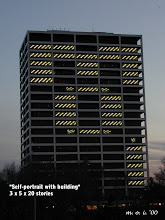Curatorial Statement.
To understand this language of sites is to appreciate the metaphor between the syntactical construct and the complex of ideas, letting the former function as a three-dimensional picture which doesn't look like a picture.This little theory is tentative and could be abandoned at any time. Theories, like things, are also abandoned. That theories are eternal is doubtful. Vanished theories compose the strata of many forgotten books.--Robert Smithson[1]
It’s possible to launch a stone from the roof of this building and have it land in the Missouri River. We’re that close. But you can’t see, touch, or smell the river from inside. The history of places stands between you and water’s edge. And these are not little obstacles. A levee. A rail line. Warehouses. Roads. Stench from past and current sins. You’d need to get through all that to arrive at water. Which, I guess, is why, despite us being that close to one of our nation’s greatest natural resources, few venture the journey. No matter how short.If, as Twain remarked, the Mississippi Basin is the body of the nation, then the Missouri River Basin is surely it’s brains, heart, and soul. The Missouri River has almost as many tributaries as stories. The stories, like tribs and fish, often get bigger if one must wait out a storm on its banks. The river also has eddies. I’ve seen them, day and night. Sometimes they make a sucking sound but mostly they remind me of meadowlarks that greet the morning. Traveler, do not be afraid of the journey that awaits. Call to it and sound its depths for it is both shallow and murky, swift and dangerous.These works are about the river in the same way that fishing is about the river. Or that Jesus was about fishing. To cast a line into the water is to understand that tension is the first surprise of any reward to follow. Some say the river waits for no one. Or did they mean time. Same thing really. River and time. I say no rain, no river. Holy water will, by definition, have some of both else it would be other-worldly rather than merely restorative. Step inside and dunk yourself in the real. Or the metaphorical. Doesn’t matter because we need both and all faiths are accepted.
[1] A Provisional Theory of Non-sites, in Robert Smithson: The Collected Writings, Jack Flam, ed., Univ. of California Press, Berkeley, California, 2nd Edition, 1996.





No comments:
Post a Comment